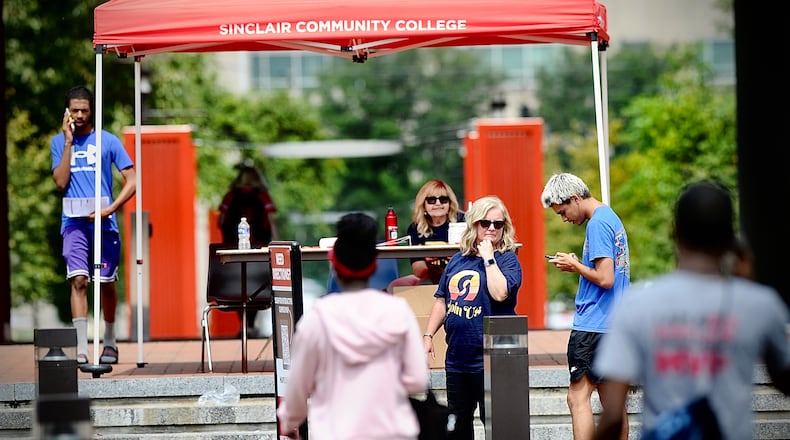The Intel plant is expected to online with workers in 2025, at the earliest, company officials have said.
The Ohio Association of Community Colleges has been working with the Ohio Department of Higher Education on curriculums and programs to train workers.
Sinclair Community College, Clark State College and Edison State Community College are three of the community colleges in the region, all of which will have programs to train people to work in semiconductor factories like Intel’s. Universities like Central State and Wright State are also in on the plans with scholarships and internships available, especially at Central State.
“We want to have the best educated and trained workforce in the Midwest,” said Ohio Lt. Gov. Jon Husted at a press conference last month announcing programs that will train students for jobs in the Intel plant. “That’s our aspiration.”
To get there, colleges had to work together to come up with standardized curriculums so credits can easily transfer from one college to another. Intel officials reviewed curriculum to give feedback on what students needed to be taught, state officials said.
While community colleges have some programs already, more are expected to be launched in the next few years.
Available programming
Clark State was one of the colleges who was involved in curriculum development. Nora Hatem, Clark State professor of engineering technologies, worked on one of the panels.
One Clark State course currently offered is a manufacturing foundations course, which was adopted as the state-approved curriculum pathway, said Adam Parrillo, dean for Clark State’s school of business and applied technologies.
Sinclair Community College has already created a new course called EGR 2205—Integrated Circuit (IC) Fabrication Techniques, which will be offered for the first time next spring, said Cathy Petersen, spokeswoman for Sinclair. They also have three other courses related to what factory workers will be doing - Introduction to Semiconductors and Cleanroom Processing, Introduction to Manufacturing, and Vacuum Systems.
Edison State has associate degrees and certificates in Engineering and Manufacturing Technologies, said Bruce McKenzie, spokesman for Edison.
Rick Woodfield, chief academic officer for the Ohio Association of Community Colleges, said during a presentation in July that the state’s curriculum is aimed at making sure people are prepared for Intel jobs, including making sure that people are comfortable working in bunny suits all day next to chemicals they might not have heard of before.
“We’re really trying to incorporate all of that workforce reality right from the beginning right in the early onset of their training,” he said.
All of those current community college programs are going to be expanded. Sinclair, Edison and Clark State have plans to add to their existing courses in upcoming years to align with what the state wants to accomplish in creating this workforce.
Scholarships
There is money available for people who are interested in going into these fields, but it depends on the person’s financial aid needs and what types of jobs they might be interested in.
In-Demand Jobs and Choose Ohio First scholarships are available to students who plan to get a certificate in an in-demand job field in the state. They’re available for many kinds of degrees and awarded by the institution the student is attending.
To receive financial aid, students have to fill out a FAFSA, or Free Application for Federal Student Aid, which can be time-consuming and hard to understand. But most colleges and universities have financial aid offices available to help students through the process and offer workshops to help students who are struggling.
About the Author

